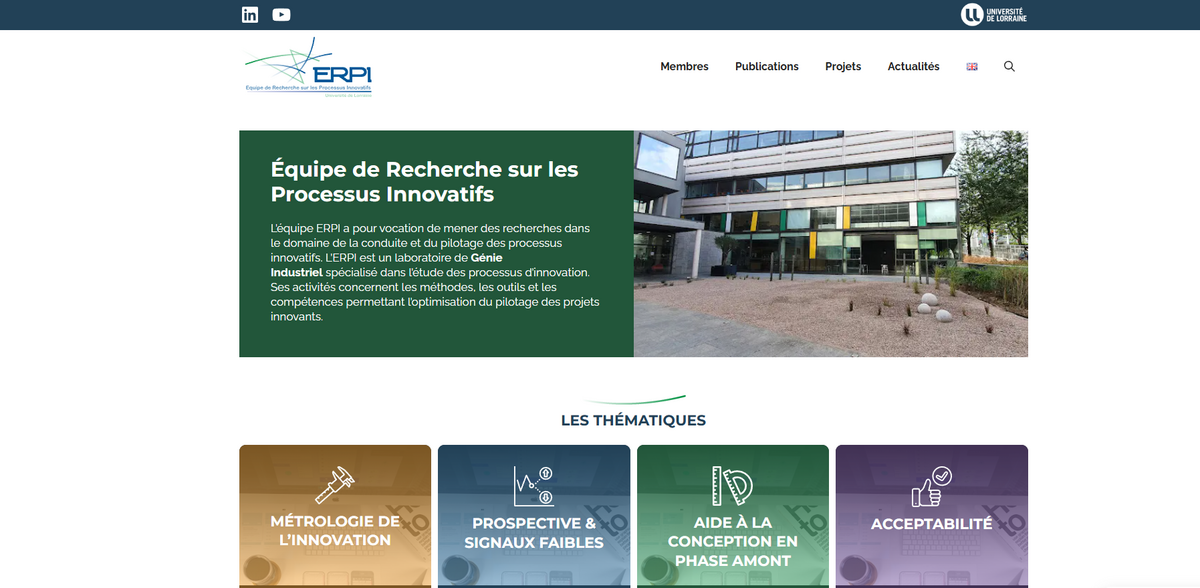What is the ERPI Research Team on Innovative Processes?
ERPI – RESEARCH TEAM ON INNOVATIVE PROCESSES is an established research initiative dedicated to exploring and improving the ways in which innovative processes are managed and steered. The team is housed within an Industrial Engineering laboratory that specializes in the study of innovation processes. Its focus lies in discovering methods, tools, and skills necessary for optimizing the management of innovative projects. With a clear commitment to advancing knowledge in the realm of industrial innovation, ERPI relentlessly investigates the core principles that drive creative and efficient project design and execution. This project exemplifies a blend of academic rigor and practical application, offering a dynamic approach that has resonated well within academic and professional communities alike…
Main Benefits and Key Figures
The benefits of the ERPI project can be appreciated through a variety of complementary thematic areas that are central to its mission:
- METROLOGY OF INNOVATION: Emphasizes capacity to innovate, internationalization, and Lean Six Sigma practices.
- PROSPECTIVE & WEAK SIGNALS: Focuses on technological emergence, product, process, and sector maturity.
- AID TO DESIGN IN THE EARLY PHASE: Encompasses collective, collaborative, and distributed creativity alongside thorough needs analysis.
- ACCEPTABILITY: Concentrates on product, process, sector, and user experience modeling as well as novice/expert modeling.
Each thematic area contributes to a multifaceted approach for nurturing and developing innovations, ensuring that every element from early concept design to final acceptance fits into a coherent and measurable framework.
Innovative Spaces and Collaborative Tools
A major asset of the ERPI project is the Lorraine Fab Living Lab® (LF2L®). LF2L® is a platform designed to facilitate the creation and realization of ideas with remarkable immediacy, all through a process grounded in the paradigm of use. By bringing together complementary cutting-edge tools under one roof, LF2L® creates a vibrant, collaborative space where diverse minds can merge their skills and insights. This unique setting not only accelerates innovation but also injects a sense of community and shared purpose into the development process. Participants from various backgrounds benefit from the integrated environment, enhancing processes that might otherwise remain confined to theoretical study.
Latest News and Academic Engagements
Regular updates and dynamic academic engagements are a hallmark of the ERPI initiative. Recent news items showcase the team’s active participation in international academic events. For instance, on June 3, 2024, a delegation from the University of Santiago, Chile (USACH) participated in a four-day seminar at the Lorraine Fab Living Lab. This event, organized by ENSGSI to conclude the CLIP program, not only celebrated collaborative achievements but also paved the way for future research and teaching support platforms. Another noteworthy event was the doctoral thesis defence by Léa Kozak, which took place on December 9, 2024, in amphi A1 of ENSGSI. Even earlier, on November 6, 2024, the first edition of the welcome seminar for ERPI doctoral students was held, underscoring the institution’s commitment to mentoring new scholars and fostering a thriving academic community… Such engagements reveal the pulse of the project, continually enriched by fresh insights and global collaboration.
Strategic Partnerships and Networks
ERPI’s progress and impact are significantly bolstered by strategic partnerships and dedicated support from a variety of academic and scientific organizations. Collaborative efforts include ties with Lorraine INP ENSGI Nancy, the SIMPPE Doctoral School, EMPP Energy Mechanical Processes Products, and initiatives like “Europe Commits in Grand Est” alongside the backing of the European Union. These partnerships are not just names on paper; they represent a robust network that enhances research capability and ensures sustained relevance in the fast-paced world of innovative technologies. Moreover, being part of national and international networks such as the Carnot Institute Iceel, European Network of Living Labs, Research Network on Innovation, and CNRS/GDR MACS adds a significant layer of credibility and outreach, paving the way for broader collaborative research endeavors.
Academic Excellence and Technological Prowess
Beyond its immediate research focus, ERPI illustrates academic excellence in the realm of technological innovation. Its research endeavors are tightly interwoven with the latest academic rigor and practical methodologies. The thematic areas not only bring targeted knowledge but also facilitate the practical handling of challenges related to capacity building, technological emergence, and the modeling of acceptability. The dual consideration of both product and process serves as a reminder that innovation is as much about ideas as it is about execution. Regular academic updates—including high-profile seminars and thesis defences—serve as milestones that testify to the project’s thriving spirit and the vibrant academic discourse it continually nurtures.
Project Impact
- SDG 4: Quality Education – Through its comprehensive academic engagements and support for doctoral students.
- SDG 9: Industry, Innovation and Infrastructure – By advancing practical methodologies for innovation and fostering collaborative high-tech environments.
- SDG 17: Partnerships for the Goals – Via robust partnerships with academic institutions, research networks, and international organizations.
Conclusion and Future Prospects
The ERPI project stands as a dynamic beacon in the world of industrial innovation and process management. With its roots firmly planted in academic inquiry and its branches reaching into collaborative, real-world applications, the initiative successively bridges the gap between theory and practice. Its distinctive focus on thematic areas such as metrology of innovation, prospective analysis, early phase design aid, and acceptability modeling ensures that every facet of the innovation journey is meticulously explored and optimized. The collaborative environment fostered by LF2L® and the array of strategic partnerships further reinforce the potential for groundbreaking developments in both academic and industrial practices. Looking ahead, the project is well-positioned to continue its influential role, relentlessly pushing the envelope of research and pragmatic implementation within the vibrant sphere of technological innovation… Its sustained impact on quality education, industrial innovation, and cross-sector partnerships is paving the way for future successes that promise to redefine the landscape of research and development.





















